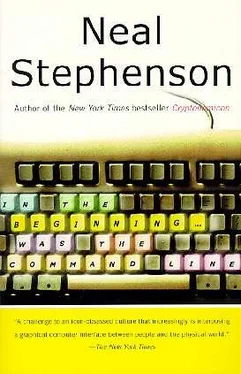Neal Stephenson - In the Beginning was the Command Line
Здесь есть возможность читать онлайн «Neal Stephenson - In the Beginning was the Command Line» весь текст электронной книги совершенно бесплатно (целиком полную версию без сокращений). В некоторых случаях можно слушать аудио, скачать через торрент в формате fb2 и присутствует краткое содержание. Жанр: Фантастика и фэнтези, на английском языке. Описание произведения, (предисловие) а так же отзывы посетителей доступны на портале библиотеки ЛибКат.
- Название:In the Beginning was the Command Line
- Автор:
- Жанр:
- Год:неизвестен
- ISBN:нет данных
- Рейтинг книги:5 / 5. Голосов: 1
-
Избранное:Добавить в избранное
- Отзывы:
-
Ваша оценка:
- 100
- 1
- 2
- 3
- 4
- 5
In the Beginning was the Command Line: краткое содержание, описание и аннотация
Предлагаем к чтению аннотацию, описание, краткое содержание или предисловие (зависит от того, что написал сам автор книги «In the Beginning was the Command Line»). Если вы не нашли необходимую информацию о книге — напишите в комментариях, мы постараемся отыскать её.
In the Beginning was the Command Line — читать онлайн бесплатно полную книгу (весь текст) целиком
Ниже представлен текст книги, разбитый по страницам. Система сохранения места последней прочитанной страницы, позволяет с удобством читать онлайн бесплатно книгу «In the Beginning was the Command Line», без необходимости каждый раз заново искать на чём Вы остановились. Поставьте закладку, и сможете в любой момент перейти на страницу, на которой закончили чтение.
Интервал:
Закладка:
The streets of every city in the world are filled with those hulking, rattling station wagons. Anyone who doesn't own one feels a little weird, and wonders, in spite of himself, whether it might not be time to cease resistance and buy one; anyone who does, feels confident that he has acquired some meaningful possession, even on those days when the vehicle is up on a lift in an auto repair shop.
All of this is perfectly congruent with membership in the bourgeoisie, which is as much a mental, as a material state. And it explains why Microsoft is regularly attacked, on the Net, from both sides. People who are inclined to feel poor and oppressed construe everything Microsoft does as some sinister Orwellian plot. People who like to think of themselves as intelligent and informed technology users are driven crazy by the clunkiness of Windows.
Nothing is more annoying to sophisticated people to see someone who is rich enough to know better being tacky--unless it is to realize, a moment later, that they probably know they are tacky and they simply don't care and they are going to go on being tacky, and rich, and happy, forever. Microsoft therefore bears the same relationship to the Silicon Valley elite as the Beverly Hillbillies did to their fussy banker, Mr. Drysdale--who is irritated not so much by the fact that the Clampetts moved to his neighborhood as by the knowledge that, when Jethro is seventy years old, he's still going to be talking like a hillbilly and wearing bib overalls, and he's still going to be a lot richer than Mr. Drysdale.
Even the hardware that Windows ran on, when compared to the machines put out by Apple, looked like white-trash stuff, and still mostly does. The reason was that Apple was and is a hardware company, while Microsoft was and is a software company. Apple therefore had a monopoly on hardware that could run MacOS, whereas Windows-compatible hardware came out of a free market. The free market seems to have decided that people will not pay for cool-looking computers; PC hardware makers who hire designers to make their stuff look distinctive get their clocks cleaned by Taiwanese clone makers punching out boxes that look as if they belong on cinderblocks in front of someone's trailer. But Apple could make their hardware as pretty as they wanted to and simply pass the higher prices on to their besotted consumers, like me. Only last week (I am writing this sentence in early Jan. 1999) the technology sections of all the newspapers were filled with adulatory press coverage of how Apple had released the iMac in several happenin' new colors like Blueberry and Tangerine.
Apple has always insisted on having a hardware monopoly, except for a brief period in the mid-1990s when they allowed clone-makers to compete with them, before subsequently putting them out of business. Macintosh hardware was, consequently, expensive. You didn't open it up and fool around with it because doing so would void the warranty. In fact the first Mac was specifically designed to be difficult to open--you needed a kit of exotic tools, which you could buy through little ads that began to appear in the back pages of magazines a few months after the Mac came out on the market. These ads always had a certain disreputable air about them, like pitches for lock-picking tools in the backs of lurid detective magazines.
This monopolistic policy can be explained in at least three different ways.
THE CHARITABLE EXPLANATION is that the hardware monopoly policy reflected a drive on Apple's part to provide a seamless, unified blending of hardware, operating system, and software. There is something to this. It is hard enough to make an OS that works well on one specific piece of hardware, designed and tested by engineers who work down the hallway from you, in the same company. Making an OS to work on arbitrary pieces of hardware, cranked out by rabidly entrepeneurial clonemakers on the other side of the International Date Line, is very difficult, and accounts for much of the troubles people have using Windows.
THE FINANCIAL EXPLANATION is that Apple, unlike Microsoft, is and always has been a hardware company. It simply depends on revenue from selling hardware, and cannot exist without it.
THE NOT-SO-CHARITABLE EXPLANATION has to do with Apple's corporate culture, which is rooted in Bay Area Baby Boomdom.
Now, since I'm going to talk for a moment about culture, full disclosure is probably in order, to protect myself against allegations of conflict of interest and ethical turpitude: (1) Geographically I am a Seattleite, of a Saturnine temperament, and inclined to take a sour view of the Dionysian Bay Area, just as they tend to be annoyed and appalled by us. (2) Chronologically I am a post-Baby Boomer. I feel that way, at least, because I never experienced the fun and exciting parts of the whole Boomer scene--just spent a lot of time dutifully chuckling at Boomers' maddeningly pointless anecdotes about just how stoned they got on various occasions, and politely fielding their assertions about how great their music was. But even from this remove it was possible to glean certain patterns, and one that recurred as regularly as an urban legend was the one about how someone would move into a commune populated by sandal-wearing, peace-sign flashing flower children, and eventually discover that, underneath this facade, the guys who ran it were actually control freaks; and that, as living in a commune, where much lip service was paid to ideals of peace, love and harmony, had deprived them of normal, socially approved outlets for their control-freakdom, it tended to come out in other, invariably more sinister, ways.
Applying this to the case of Apple Computer will be left as an exercise for the reader, and not a very difficult exercise.
It is a bit unsettling, at first, to think of Apple as a control freak, because it is completely at odds with their corporate image. Weren't these the guys who aired the famous Super Bowl ads showing suited, blindfolded executives marching like lemmings off a cliff? Isn't this the company that even now runs ads picturing the Dalai Lama (except in Hong Kong) and Einstein and other offbeat rebels?
It is indeed the same company, and the fact that they have been able to plant this image of themselves as creative and rebellious free-thinkers in the minds of so many intelligent and media-hardened skeptics really gives one pause. It is testimony to the insidious power of expensive slick ad campaigns and, perhaps, to a certain amount of wishful thinking in the minds of people who fall for them. It also raises the question of why Microsoft is so bad at PR, when the history of Apple demonstrates that, by writing large checks to good ad agencies, you can plant a corporate image in the minds of intelligent people that is completely at odds with reality. (The answer, for people who don't like Damoclean questions, is that since Microsoft has won the hearts and minds of the silent majority--the bourgeoisie--they don't give a damn about having a slick image, any more then Dick Nixon did. "I want to believe,"--the mantra that Fox Mulder has pinned to his office wall in The X-Files--applies in different ways to these two companies; Mac partisans want to believe in the image of Apple purveyed in those ads, and in the notion that Macs are somehow fundamentally different from other computers, while Windows people want to believe that they are getting something for their money, engaging in a respectable business transaction).
In any event, as of 1987, both MacOS and Windows were out on the market, running on hardware platforms that were radically different from each other--not only in the sense that MacOS used Motorola CPU chips while Windows used Intel, but in the sense--then overlooked, but in the long run, vastly more significant--that the Apple hardware business was a rigid monopoly and the Windows side was a churning free-for-all.
Читать дальшеИнтервал:
Закладка:
Похожие книги на «In the Beginning was the Command Line»
Представляем Вашему вниманию похожие книги на «In the Beginning was the Command Line» списком для выбора. Мы отобрали схожую по названию и смыслу литературу в надежде предоставить читателям больше вариантов отыскать новые, интересные, ещё непрочитанные произведения.
Обсуждение, отзывы о книге «In the Beginning was the Command Line» и просто собственные мнения читателей. Оставьте ваши комментарии, напишите, что Вы думаете о произведении, его смысле или главных героях. Укажите что конкретно понравилось, а что нет, и почему Вы так считаете.








